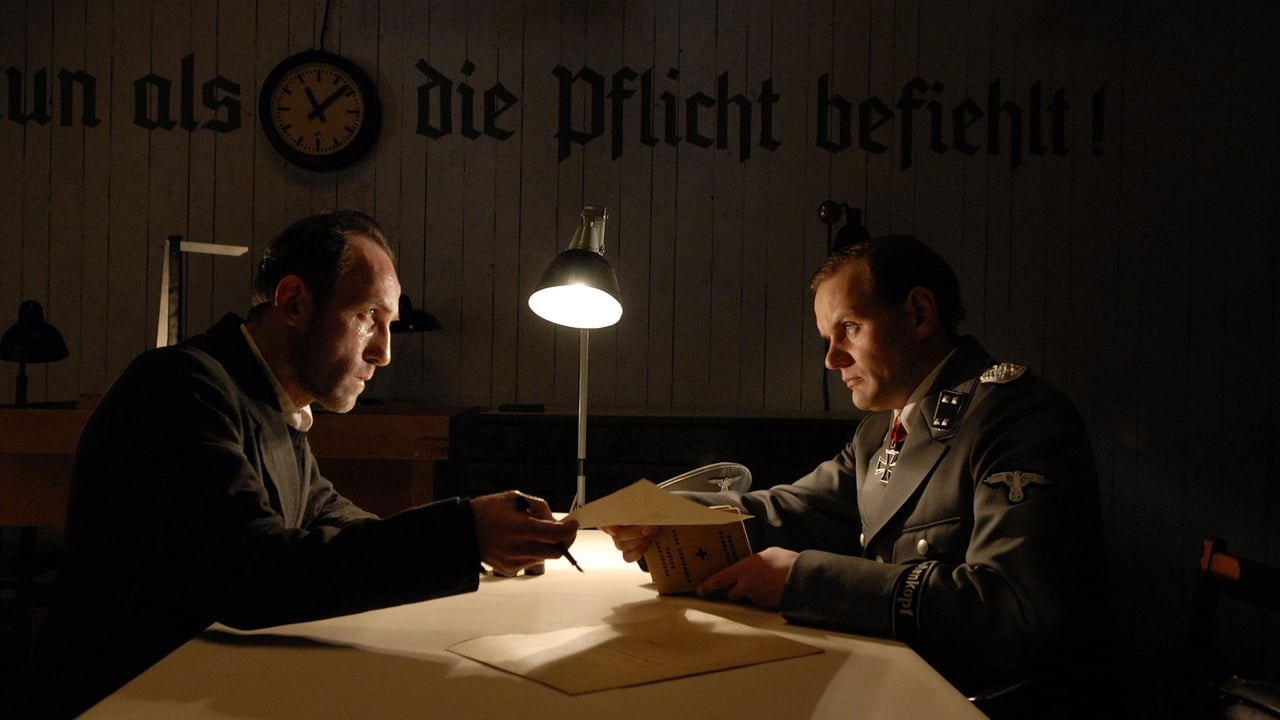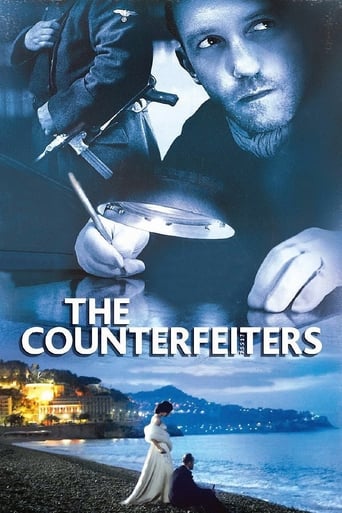



The greatest movie ever!
Slow pace in the most part of the movie.
After playing with our expectations, this turns out to be a very different sort of film.
View MoreBy the time the dramatic fireworks start popping off, each one feels earned.
View MoreAtze (Veit Stübner): "Warum ist Gott nicht in Auschwitz? Der kam nicht durch die Selektion!"Die Fälscher is one of my favorite movies about the Holocaust. It's an Austrian film where the Nazi pigs bark in German (not English) and the victims speak, cry and pray in German, Russian, and Hebrew (not English). I can't stand the Holocaust movies where the Nazis speak English with a German accent, no matter how good the movie is. That goes for Schindler's List and many others (the only exception is probably The Pianist, an excellent film that if it were in Polish and German would be a real masterpiece).In Die Fälscher one can really breath the brutality of the small Nazi concentration camps (there are no extermination camps shown here). Viktor Frankl wrote that in the ordinary small concentration camps most of the extermination took place. In Die Fälscher we see a Nazi pig kicking to death a prisoner in Buchenwald and we see how little life was worth in Sachsenhausen (you could be shot any time and for no reason). The elegant and cultivated German Nazis could kill and torture as much as they felt like.The film focuses on the biggest con operation of the entire history: Operation Bernhard. Operation Bernhard managed to counterfeit more than 134 million British pounds and some American dollars. Created in 1942 by the Nazi Germans and developed in Sachsenhausen's Blocks 18 and 19 by 142 Jewish prisoners who were forced to forge millions, Operation Bernhard could have given a dramatic turn to the war. The Nazis counterfeited not only British pounds and American dollars, but also many passports, identity cards, birth and marriage certificates, other official documents, and stamps. The Nazis were not only cruel and monstrous (we know that they loved to gas men, women, and children, and that they enjoyed massacring people and burning babies alive), but they were also great thieves (they stole many Aryan-looking Polish children – after having killed their parents, of course–) and they were also the greatest common criminals: they organized the biggest con operation of all times (but, luckily, too late). The Nazi Germans possessed all of the disgusting and lowest attributes that a human can have: racism, violence, cruelty, and dishonesty. And all that beautiful pack came from one of the most cultivated countries of the entire world. The Germans, with their amazing philosophy, their amazing poetry, their amazing music and their amazing art produced the most horrific monstrosity of human history: the Holocaust.Die Fälscher is loosely based on the memoirs of Adolf Burger, originally written in Czech (Komando padělatelů) and first published in 1983. The translation into English was published only 26 years later (in 2009) under the title The Devil's Workshop: A Memoir of the Nazi Counterfeiting Operation (I didn't read the book, but I just ordered it). Burger was a Jewish Slovak typographer and Holocaust survivor born in 1917. He was deported to Auschwitz-Birkenau together with his wife when he was 25 years old, in 1942. At that time he was making fake baptism certificates to save Jews. In Auschwitz-Birkenau he was tattooed with the number 64401. His wife perished in Auschwitz that year. He survived 18 months in Auschwitz-Birkenau and was then transferred to Sachsenhausen (April 1944) to work in Operation Bernhard. In 1945 he was transferred to the Ebensee concentration camp (a camp within the Mauthausen network) until its liberation by the US Army on May 6, 1945 (that isn't shown in the movie). Burger died 10 months ago in Prague, age 99 (yes, 99!), in December 2016. The casting of the film is superb. Karl Markovics (who portrays Sorowitsch, a character based on the real Salomon Smolianoff, an Ukrainian Jewish professional counterfeiter who died in Brazil at age 76) gives an outstanding performance. I really love this actor. He's amazing. August Diehl (the famous SS whom Fassbender blew his balls off in Inglourious Basterds) plays the real Burger. He appears super thin and his performance is stunning. Sebastian Urzendowsky plays Kolya, a young Russian painter also involved in Operation Bernhard. His performance is breathtaking (Urzendowsky gave an impressive performance too in the German film Berlin'36). Devid Striesow plays the Nazi Herzog, to my taste a too nice and soft character. Herzog is based on the real Bernhard Krüger, a murderous SS who led Operation Bernhard (the operation was named after him). As the vast majority of German and Austrian murderers, Krüger got off scot-free (after a brief period of detention) and died peacefully in Germany at age 84. Charlie Chaplin's granddaughter (Dolores Chaplin) makes a small appearance in the film.The tango music of the film (written by Marius Ruhland) is truly amazing. The details of the film are really painful and really well made: the apple, the bloody hands, the second hand clothing, the touching of the clean bed sheets, the reaction of Kolya at the beginning of the shower, the huge humiliation in the toilet, the walking-corps after the liberation of Sachsenhausen Around 134 million counterfeit British pounds were produced at Sachsenhausen. In 1945 Operation Bernhard moved to Mauthausen. In 1959 some of the boxes with counterfeit British pounds were discovered at the bottom of Lake Toplitz (in the Austrian Alps), and in 2000 the same company who discovered the Titanic pull out from the lake many boxes with counterfeit British pounds and some counterfeit American dollars.Die Fälscher won the Oscar for Best Foreign Language (Austria). After it won the Oscar, Burger said that he felt happy because now more people would see the movie and will know that the Nazis were not just murderers but also common criminals.The worst: some small factual errors.The best: everything else.
View MoreStefan Ruzowitzky's "Die Fälscher" is an Academy award winning movie set during World War II about Jewish prisoners forced to create perfect imitations of the Pound and the Dollar in order to destroy the British and American economy. Ruzowitzky, at this point, was mostly known for the two "Anatomie" thrillers and a horribly received movie named "All the Queen's Men" obviously being at least a name parody of the classic "All the King's Men". For "Die Fälscher", he adapted Adolf Burger's book and it became a massive success. Looks like the Academy still loves a good Nazi movie. Maybe it was because, the aspect of falsifying money has during the years of WWII has not been too present in movies so far. Strangely enough, none of the 5 Foreign Language film nominees were nominated at the Globes that year, so it was a very open race. At the German Film Awards, the movie only managed to win one of its seven nominations, namely David Striesow as supporting actor (a Nazi general who sees the Jews more as his staff than his prisoners, but is evil nonetheless if they don't deliver), although I personally thought that Diehl and Brambach gave better supporting performances as a heroic Jew and ruthless Nazi officer.All in all, this is a movie that is well-written, well-directed, well-acted and well-crafted in every regard, but still somehow I felt something was missing for greatness. Still, I thought Markovics (who you may have seen on "Kommissar Rex" many years ago) gives a pretty good performance who is stuck between his loyalty to Jewism/hate towards Nazis and his dedication to his craft. He wants to succeed as a falsifier, even if he works for his biggest enemy. It is interesting how he can justify this dedication with the fact that he has to succeed in order to not be killed. At the beginning we see that he survived (the beginning, the post-war scenes are maybe my favorite from the film) the concentration camp. But that does not hurt the film at all. It's not really about the question if he will survive. It's much more of a character study and also about his relationship with Diehl's character. One of the most interesting moments in that relationship is when we find out that Diehl's character's wife is killed in another concentration camp. Diehl's character is by the way the writer of the book.Finally, almost at the ending, there is quite some irony that it is their concentration camp tattoos that basically save their lives when allied forces initially mistake them for Nazis. And as we are at the now again when the film closes, we see how Markovics' character somehow lacks direction and goals as he is no longer printing fake money for the Nazis, what he could do best. It reminds me of how prison inmates often struggle when they are released into freedom again. Maybe you remember the famous scene from "Shawshank Redemption". Anyway, "Die Fälscher" is a good film all in all. Not sure if it is a worthy Academy Award winner. I may have given the Foreign Language win to "Let The Right One in" that year, but I still recommend watching it, especially if you have an interest in German/Austrian cinema or just World War II movies in general.
View MoreThere have been countless films about WWII and the holocaust--lots. I have watched many of them but my family refuses. As my oldest daughter has said many times "I know what happened then. It was awful and evil. And, I've seen enough of them!". However, "The Counterfeiters" is not just another film about the holocaust but discussed an obscure but true story about a small number of Jewish prisoners who were able to spare their lives by working WITH the Nazis. Let me explain. The Nazis came up with a plan to destroy the economies of their enemies. First, they wanted to produce tons and tons of British pounds and flood the market with them. Then, do the same with the American dollar. And, while most may not know it, they were successful in producing perfect qualities pounds and dollars. This film is about how they did it and why, ultimately, the plan didn't change the outcome of the war.The film has some wonderful acting, a taut script and recreates the horror of the concentration camps. It's not pleasant but it IS also very fascinating--particularly the story of the hero (??) of the film--a cheap criminal with a talent for forgeries. Well worth seeing and a film that took the Best Foreign Language Oscar.
View MoreA more-then-competent Shoah film, The Counterfeiters uses the story of a team of Jewish forgers to once again tell the ashen tale. Karl Markovics' master forger Sorowitsch is arrested during the rise of pre- war Nazi Germany, levering a cushy life at his concentration camp by drawing hagiographic images of the guards. He is taken from the camp to resurrect his counterfeiting skill as part of a specialist gang planning to destabilise the Allied markets.Sorowitsch's relationship to the camp commander and the man who arrested him, Herzog, as well as the constant moral tension of helping the Nazi war effort to stay alive, constitute the film's drama. The counterfeiters are separated from the rest of their camp by a simple wooden wall, through which all manner of dread sounds are heard throughout. The fall of this division towards the end of the film is a strong blow and justifies the prosaic nature of the rest of the film, in terms of the canon of Holocaust film making. 7/10
View More